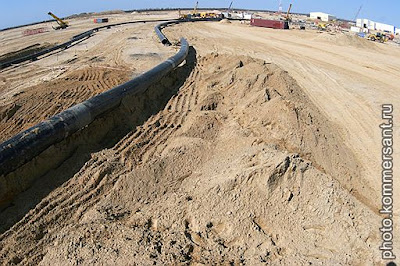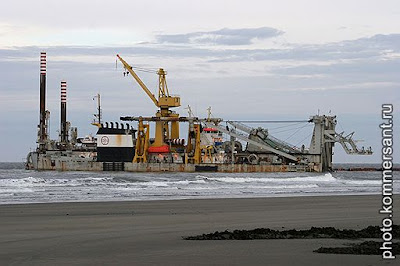
Transportation Minister Igor Levitin announced yesterday that a new seaport would be built in the Sakhalin village of Ilyinsky to serve the future development of hydrocarbon deposits off the shores of the island. He cited the need to provide transportation in connection with Sakhalin projects 3 through 9. The new port, he said, would be served by oil and natural gas pipelines that will make hydrocarbon transportation for future projects 10-15 percent cheaper than for Sakhalin 1 and 2. The port will also serve general uses and will cost 82 billion rubles ($3.2 billion), of which the government will provide 37 billion rubles.

At present, there is nothing to load at such a port, nor could experts consulted by Kommersant suggest when it might be needed. The operators of Sakhalin 1 and 2 declined to comment on the Transportation Ministry proposal, but noted that they were not recasting their existing transportation plans.
Two international consortia allied with Rosneft are carrying out exploration for the Sakhalin 3,4 and 5 projects, for which Rosneft is planning to build an underwater pipeline to the De Castri oil terminal. Gazprom Neft owns the Lopukhovsky bloc between Sakhalin 4 and 5. It does not have transportation plans yet. Petrosakh, a subsidiary of Urals Energy is working on Sakhalin 6. It has its own mini–oil refinery and plans to sell its products on the Sakhalin market. None of the experts consulted were aware of the Sakhalin 7, 8 or 9 projects.
This is the second massive project announced by the Transportation Ministry in the last few days. Earlier, it announced a $6-billion investment in the Port of Murmansk, which experts also found dubious. Experts requesting anonymity have linked the ministry's announcements to the upcoming elections.

At present, there is nothing to load at such a port, nor could experts consulted by Kommersant suggest when it might be needed. The operators of Sakhalin 1 and 2 declined to comment on the Transportation Ministry proposal, but noted that they were not recasting their existing transportation plans.
Two international consortia allied with Rosneft are carrying out exploration for the Sakhalin 3,4 and 5 projects, for which Rosneft is planning to build an underwater pipeline to the De Castri oil terminal. Gazprom Neft owns the Lopukhovsky bloc between Sakhalin 4 and 5. It does not have transportation plans yet. Petrosakh, a subsidiary of Urals Energy is working on Sakhalin 6. It has its own mini–oil refinery and plans to sell its products on the Sakhalin market. None of the experts consulted were aware of the Sakhalin 7, 8 or 9 projects.
This is the second massive project announced by the Transportation Ministry in the last few days. Earlier, it announced a $6-billion investment in the Port of Murmansk, which experts also found dubious. Experts requesting anonymity have linked the ministry's announcements to the upcoming elections.

Via|Kommersant
Found this post useful? Consider subscribing to
